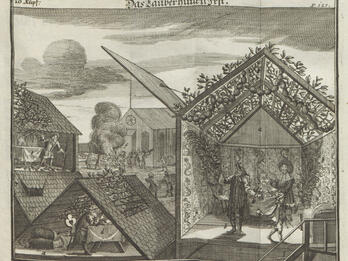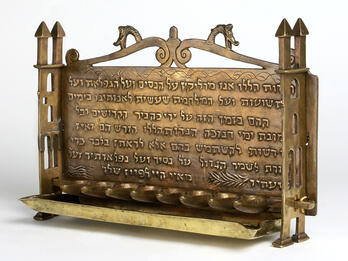Higayon be-kinor (Melody of the Lyre)
Judah Moscato
1588
The first sermon, entitled “Sounds for Contemplation on a Lyre (kinnor)”; for the day of Simḥat Torah (“Rejoicing in the Law”).
The Argument of the Sermon: The sermon in its main argument will open with the riddle of the kinnor and, via songs, will exult before the King, the Lord, to proclaim and reveal that all those called by His name and for His…
Related Guide
Early Modern Italy: Where East and West Meet
Ashkenazim, Sephardim, and Marranos encountered each other in Italian cities, developing community structures that later influenced Jewish communal organization throughout the western world.
Related Guide
Early Modern Jewish Languages
As Ashkenazi and Sephardi Jews migrated eastward, Yiddish and Ladino emerged as distinct languages. Both languages developed literary traditions, as print became more widespread.
Related Guide
Early Modern Literature and the Arts
Jewish literary creativity flourished in the early modern period, dominated by Hebrew poetry that blended religious themes with Renaissance forms.
Creator Bio
Judah Moscato
Judah ben Joseph Moscato was born in Osimo, Italy. Following an edict issued by Pope Pius V in 1569 expelling the Jews, Moscato settled in Mantua. There he became the community’s official preacher and subsequently, in 1587, chief rabbi. Moscato was well versed in classical philosophy, contemporary Italian literature, and kabbalah. Among his major works are Kol Yehudah (Voice of Judah; 1594), a commentary on Judah Halevi’s Kuzari, and Nefutsot Yehudah (The Dispersed of Judah; 1598), a collection of sermons. Moscato often cited non-Jewish sources, justifying this with the claim that all great philosophers and writers were the disciples of Jewish kings and prophets. He applied the same concept to Renaissance music. Moscato may have preached in Italian, as non-Jewish scholars apparently came to hear his sermons. Many preachers applied his methods and ideas, creating a new school of homiletics, and he came to be known as one of the most important preachers and authors among Jews in Renaissance Italy. He also composed liturgical poems and dirges.
You may also like

Jewish Man in Cairo

Sukkot
Arugat ha-bosem (Bed of Spices)
Shilte ha-giborim (Shields of the Mighty)



